Storing your food properly is one of the best ways to protect yourself and your family from food poisoning. If food is not properly stored and chilled, the harmful bacteria it contains can multiply quickly leading to food spoilage and possible illness.
To prevent bacterial growth, refrigerate or freeze leftovers as quickly as possible (ideally within two hours of cooking). Leftovers must be placed in containers with tight-fitting lids or covered tightly with plastic wrap to minimize potential contamination.
Food containers extend the shelf life of food and prevent it from drying out, developing freezer burn, and acquiring odors. Make sure your food storage containers are clean and that you only use them to store food and leftovers.
Advantages of Food Storage Containers
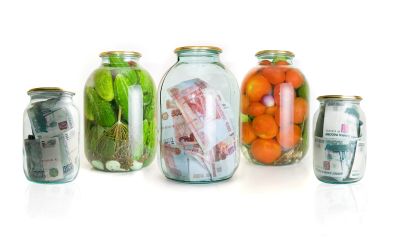
Food storage containers are used to keep food fresh, help organize our kitchen space, and make cooking easier.
- Food containers help keep food clean, fresh, tasty, and nutritious for longer.
- By storing additional quantities of food we can save money. Storing leftovers in appropriate food containers helps prevent food waste.
- Food storage containers are portable and can be put in handbags, making transporting food to different locations easy.
- Storing food in reusable containers is one of the best ways to reduce the environmental impact of single-use containers.
- Food containers can also preserve pantry foods such as spices, tea, rice, flour, grains, and a range of kitchen ingredients that need storage.
What Are The Advantages of Glass Storage Containers
Glass food containers offer more benefits than plastic containers, making them a better choice for food storage.
1. Glass is safer for storing food than plastic
Glass is overall safer for food storage than plastic. Chemicals from plastic containers can leach from the plastic into your food. This often occurs when hot food is placed in a plastic bag or when heated in the microwave.
Glass food storage containers do not release unwanted, toxic chemicals when they come into contact with food. Glass is an inert and non-porous natural material. Glass containers are leak-free and can be safely used repeatedly.
2. Glass is an environmentally friendly material
There are many environmental concerns associated with the production and disposal of plastics. Plastic waste is the most obvious form of environmental pollution. Plastic production also releases toxic chemicals into the air. Eliminating plastic reduces the amount of plastic that ends up in the waste stream. Once you purchase a glass storage container, you can use it almost indefinitely. Broken glass containers can be recycled. Recycling glass is cost-effective and the process does not compromise glass quality.
3. Glass holds heat better than plastic
Plastic containers can deform when they come into contact with hot food. Reheating food in plastic containers can cause them to melt, increasing the likelihood of chemical leaching.
Unlike plastic containers, there’s no need to wait for the food to cool completely before transferring the leftovers to a glass container. You don’t have to worry about transferring toxic chemicals when heating the food, as is the case with plastic food containers.
4. Multifunctional
The glass also works reliably at different temperatures, allowing you to store and heat food in the same container. Glass containers fit easily from freezer to oven to table. You can serve food in the same container that was stored and heated.
5. Glass is more attractive than plastic
Plastic containers look dried out and feel brittle after repeated use and dishwashing. Glass containers look attractive on the counter, in your refrigerator, or on your dining table. Food also looks more attractive in a glass container. The glass is non-porous and scratch-resistant. After decades of use, it still looks like new.

6. Transparent
Storing food in clear glass makes it easy to see the contents inside without removing the lid. This makes it easier to manage the food in your fridge. This also helps reduce food waste as you can easily check if there are any leftovers before they go bad.
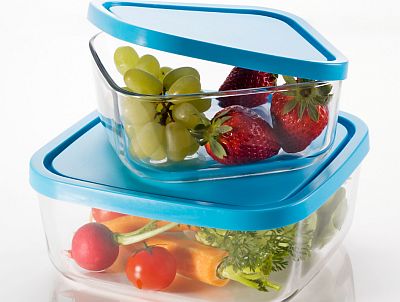
7. Glass is more hygienic than plastic
It is not recommended to put plastic containers in the dishwasher as hot water and steam can cause the plastic to release harmful chemicals.
Glass containers are very easy to clean because the non-porous glass surface does not absorb stains, food, or germs. They can be safely washed in the dishwasher without worrying about deformation or scratches. In addition, washing in the dishwasher at high temperatures contributes to disinfection.
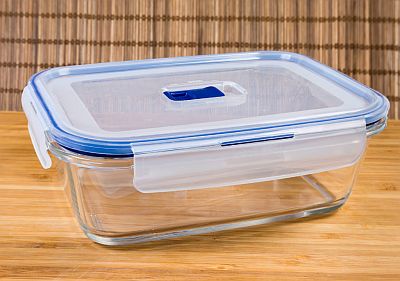
8. Glass doesn’t absorb smells
Plastic containers are often contaminated by the food stored in them. Plastic also absorbs food odors, which can last for a while.
Glass containers are non-porous and do not absorb stains or the smell of the food stored in them. This feature makes glass containers perfect for storing all foods, even foods with intense colors or smells. The smooth surface of glass food containers helps keep food clean, fresh, and tasty for longer.
9. Durable
After a year of use, plastic containers will show scratches and discoloration and may also lose their shape.
Glass food containers are designed to last. The glass is more durable and, unlike plastic, does not decompose over time. They can be reused multiple times and washed in the dishwasher without affecting their shape and durability. Unless they are dropped or hit against a hard object, they will last a lifetime.
10. Microwavable
Plastic food containers are not safe to place in the microwave because heating in the microwave can leach toxic chemicals into the food.
Glass food containers are microwave-safe. Stored in the freezer, the glass bowls of food can be quickly microwaved for launch. We can even eat food from this glass container.
The Downsides of Glass Food Containers
1. Heavy
Glass is heavier than plastic. Plastic containers are lightweight and ideal for transporting food. Plastic takes up less space and is easier to transport in a backpack. Plastic is the material of choice if you want something lightweight to transport food.
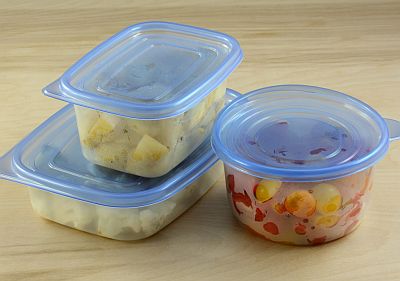
2. Fragile
Glass containers require more careful handling compared to plastic food packaging. Essentially made of molten sand, glass is fragile and can easily break if accidentally knocked on the ground or dropped. Broken glass can leave a mess. This can be a problem if you have children in your family.
3. Expensive
Glass containers are generally more expensive than plastic containers. However, glass containers last longer and do not need to be replaced as often as plastic containers. Purchasing glass food containers will save you money in the long run.
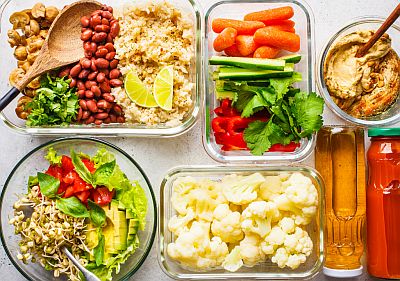
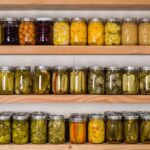


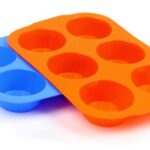
I try and make sure my containers are really sturdy when I buy them. Honestly, I’m pretty hard on my belongings and they tend to break quick. The more heavy duty item I get, the longer it will last before I need to replace it. Thanks for this great info!
This is awesome! I’ve been wary about plastic chemicals and want to switch to glass but was hesitant because I am clumsy and will probably drop them.
Recyclable
Glass packaging can be recycled for reuse numerous times. The recycling process doesn’t alter the purity or quality of the material.
Rapid Recycling
The journey of a glass container from a recycling bin to the shelf takes as little as 30 days. Around 80% of the containers are recycled to create glass bottles.
Zero Permeability
The foremost purpose of packaging is to protect products against environmental impacts and chemicals. These chemicals can seep through the container lid and alter the texture and taste of products. Glass containers offer zero permeability to chemicals and vapors. It’s impermeable and nonporous. The glass packaging doesn’t react with the products inside. This eliminates the risk of damaged taste and aroma.
Preserve Flavor
Glass containers preserve the contents within and their taste for a much longer period than other materials. This is due to the impermeable nature of glass. It doesn’t allow air or moisture to mix with the product. Especially when it comes to edibles, this quality of glass containers keeps it protected against mold and mildew growth.
Natural Packaging Solution
Can you give some opinions about: standard clear glass or low iron glass which is healthier for food storage?
Thanks
Francis
I would recommend glass due to the fact that they are more sustainable as compared to plastic. Along, with that glass is more durable and can last for years, thereby making it an ideal choice for consumer searching for a reusable container for their liquids. Moreover, glass also does not contain any form of potential harmful chemical like plastic bottles. Lastly, glass itself well to recycling, which in turn further boosts the environmental credentials of the material. If you are looking for glass bottles, glass vials and other wide range of premium quality glass material visit Premium Vials, we offer wide range of packaging solutions.
First and foremost glass jar or bottle is a much safer option as compared to plastic, when it comes to plastics certain harmful chemical might migrate from plastic to your food (during microwave heating), where glass containers on the other hand do not leach unwanted poisonous chemicals when they comes in contact of food, glass by nature is a non-porous and inert material.Secondly and most importantly glass is recyclable which reduces the global carbon footprint, where plastic on the other hand has become a major source for global environment.
As far as the cost goes, my pantry is stocked with glass jars that other food came in (large pickle jars are my favorite). So it’s like getting them for free! Also, if you have a problem with vermin, there is nothing like sealed glass jars to keep them away from the contents. Store flour in a glass jar and you will never have a flour mite problem.